本文主要是介绍slack 开源系统_一个有效利用Slack的Slack工程师系统,希望对大家解决编程问题提供一定的参考价值,需要的开发者们随着小编来一起学习吧!
slack 开源系统
The most common complaint I hear from people when I tell them I work at Slack is something along the lines of “It’s great, but I get super distracted and overwhelmed by it.”
当我告诉别人我在Slack工作时,我听到的最常见的抱怨是“虽然很棒,但我对此非常分心,不知所措”。
I get it. I was in the same boat: I’d just keep cycling through channels for no particular reason when I felt like procrastinating, only to eventually look at the time and realize an hour had gone by.
我知道了。 我在同一条船上:当我感到拖延时,我会出于特殊原因继续在各个渠道中骑行,最终只是看看时间并意识到已经过去了一个小时。
While this still happens to me sometimes, after almost a couple of years using Slack for absolutely all of my communications every day and looking at how people inside Slack use Slack, I put together my own system to manage and process Slack messages. Yes, I haven’t sent a single work email in almost two years, and I am beyond grateful. Slack is a much better way to communicate — you just need to tame it. I’ll show you how I did it.
尽管有时候这仍然会发生在我身上,但是在使用Slack进行几乎每天的所有通信并使用Slack进行了近几年的研究之后,看看Slack内部的人们如何使用Slack,我整理了自己的系统来管理和处理Slack消息。 是的,近两年来我没有发送过一封工作电子邮件,非常感谢。 松弛是一种更好的交流方式-您只需要驯服它即可。 我会告诉你我是怎么做到的。
松弛就是你的收件箱 (Slack Is Your Inbox)
I think of Slack as the inbox where I collect inputs related to my work, and my goal is to process those inputs to reach Inbox Zero every day (more on this toward the end).
我将Slack视为收件箱,我在其中收集与工作相关的输入,我的目标是处理这些输入,以每天达到零收件箱(这将在最后完成 )。
The inputs are messages. These messages will be, for the most part, sent by your colleagues to you or to a channel you’re in, but you can also use Slack to collect inputs from other sources — like your email, your calendar, your bug-ticketing system, or your task-tracking app (I’ll write a follow-up post explaining how I use Slack as a hub for all of my work inputs).
输入是消息。 这些消息大部分将由您的同事发送给您或您所在的频道,但您也可以使用Slack收集其他来源的输入,例如电子邮件,日历,错误通知系统,或您的任务跟踪应用程序(我将写一篇后续文章,解释我如何将Slack用作所有工作输入的枢纽)。
There are many kinds of messages, and not all are equally important (see next section), but, regardless of the kind, after reading a message, you have the same actions available to you:
消息种类繁多,并且并非所有消息都同等重要(请参阅下一节),但是,无论哪种消息,阅读消息后,您都可以执行相同的操作:
Act: This means either replying to the message or doing whatever is needed to produce an answer to the message. Or it can also mean just reacting to the message to signal that you’ve read it, for example 👀. A message can also spawn an unrelated flow, where you create a task in your to-do list software or create a bug in your bug tracking software, but I’ll leave that out of the diagram for simplicity.
行动 :这意味着要么答复该消息,要么做任何产生该消息答案的事情。 或者也可能意味着只对消息做出React,以表示您已阅读该消息,例如👀。 一条消息也可能产生不相关的流程,您可以在其中使用待办事项列表软件创建任务,也可以在错误跟踪软件中创建错误,但为简单起见,我将其保留在图表之外。
Defer: You can defer acting on the message — not all messages require an immediate response. Actually, I’d go as far as to say that most messages don’t need an immediate response. Most people think “Slack is real-time,” and it can be, but that’s not always the case. Many of my conversations are async — unless they’re about an urgent issue. It all depends on the predominant Slack-etiquette in your company — I’d try to improve a culture where you’re expected to reply to all your messages immediately. Also, note that there are messages that require no response.
推迟 :您可以推迟作用于消息-不是所有的邮件都需要立即响应。 实际上,我要说的是, 大多数消息不需要立即响应。 大多数人认为“ Slack是实时的”,确实可以,但是并非总是如此。 我的许多对话都是异步的-除非是关于紧急问题的对话。 这一切都取决于您公司中主要的Slack礼节-我会尝试改善一种文化,期望您立即回复所有消息。 另外,请注意,有些消息不需要响应。
Continue: I use continue here to mean you don’t need to take any specific action on the message; you can just continue processing the rest of the messages — e.g., a message sent to your project channel as an FYI.
继续 :我在这里使用“ 继续”表示您无需对邮件采取任何具体操作; 您可以继续处理其余消息,例如,作为FYI发送到您的项目通道的消息。
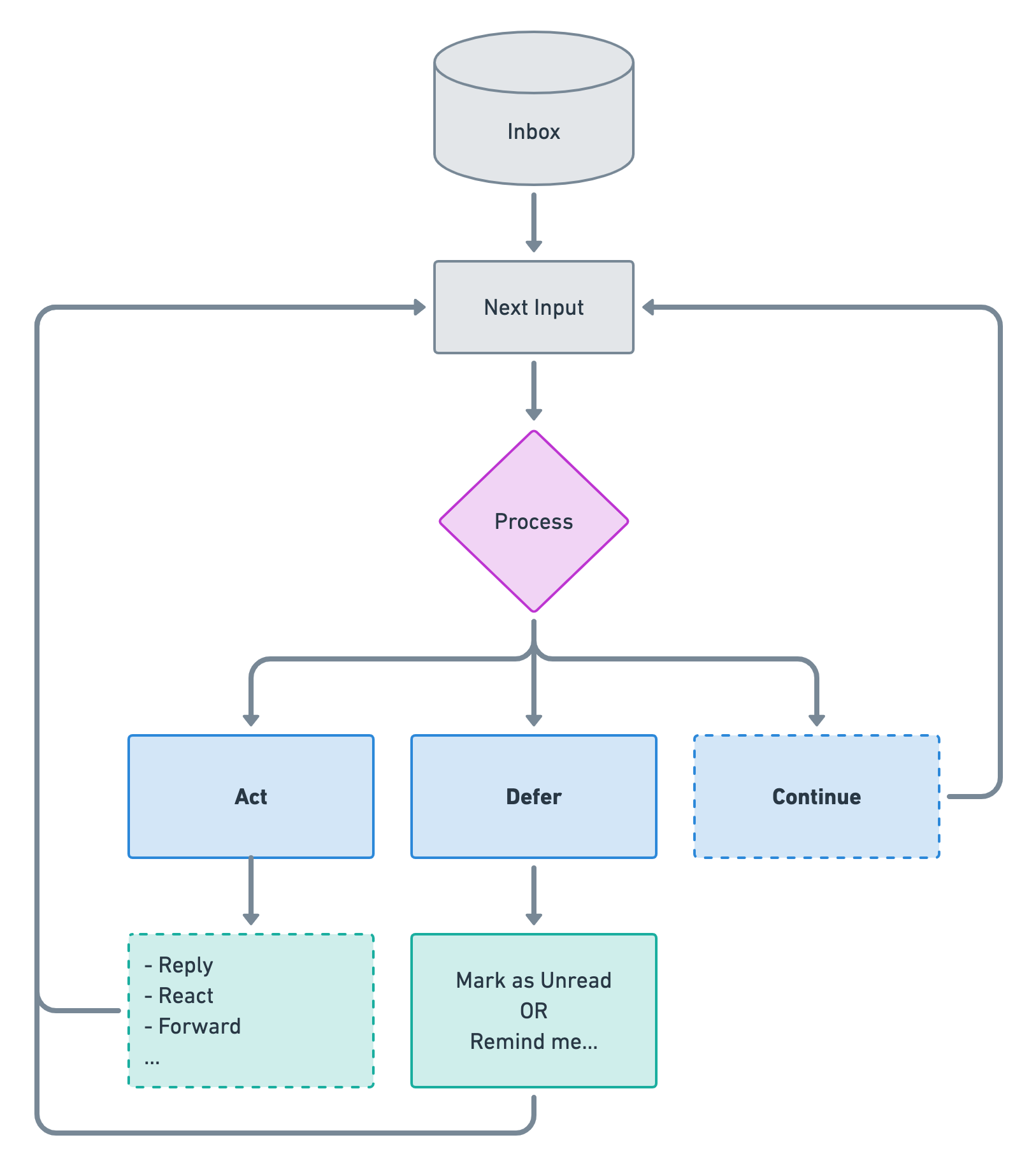
We’ll later look at how to get the Next Input in the most efficient, less distracting way possible.
稍后我们将研究如何以最有效,更分散注意力的方式获取Next Input 。
A quick note on Defer — I realize the Mark Unread and Remind me features might be novel to some people, so here's how they work:
关于Defer的简要说明-我意识到“ Mark Unread和“ Remind me功能对于某些人Remind me可能是新颖的,因此它们的工作方式如下:
To mark a message as unread, simply
Alt-Clickon it, or go to the triple-dot menu and selectMark unread. This is equivalent to marking an email as unread so you can get to it later. The power users reading this will note that this doesn’t work on threads. Yeah, sorry about that. We’ll make it work in threads eventually, I hope? But don’t despair — you can always useRemind me.要将邮件标记为未读,只需
Alt-Click它,或转到三点菜单并选择Mark unread。 这等效于将电子邮件标记为未读,以便稍后使用。 阅读此内容的高级用户将注意到,这不适用于线程。 是的,对此感到抱歉。 我们希望最终使它在线程中运行。 但是请不要失望-您可以随时使用Remind me。To ask
Slackbotto remind you about a message, simply go to the triple-dot menu and selectRemind me about this. Alternatively, you can also use the/remindcommand on any conversation (I personally do it on my DM to myself, in case I type the command wrong), like this:/remind me {whatever you want to remember} {when you want to be reminded}— e.g.,/remind me about writing Slack blogpost tomorrow at 11am.Slackbot提醒您有关消息的信息,只需转到三点菜单并选择“Remind me about this。 另外,您也可以在任何对话中使用/remind命令(我自己在DM上对自己进行操作,以防我输入错误命令),如下所示:/remind me {whatever you want to remember} {when you want to be reminded}–例如,/remind me about writing Slack blogpost tomorrow at 11am。
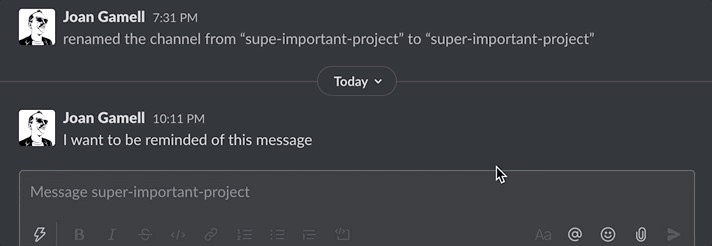
滤除噪音 (Filter Out the Noise)
If you’ve used Slack for a couple of days, you’ll know not all inputs (messages) are of the same value to you; therefore, it’s probably a good idea for you to calibrate your response accordingly.
如果您已经使用Slack几天,就会知道并非所有输入(消息)都具有相同的价值。 因此,对您进行相应的校准可能是一个好主意。
In other words, you shouldn’t stop everything you’re doing each time someone posts a picture of a kitty on #random or someone starts again with the “what is a sandwich” argument over at #foodies.
换句话说,你不应该停止一切你做的每一次有人张贴在猫咪的图片#random或某人有超过在“什么是三明治”的说法再次开始#foodies 。
On the other hand, you might (more on this later) want to stop what you’re doing to check a direct message from your teammate.
另一方面,您可能想 ( 稍后再详细介绍)停止查看来自队友的直接消息的操作。
In my mind, these are the categories I put every message in, alongside its meaning:
在我看来,这些是我将每条消息放入的类别以及其含义:
P0: Messages sent directly to me (either DMs or explicit @-mentions in a channel) and messages to threads I’ve participated in.
P0 :直接发送给我的消息(DM或通道中的显式@ -mentions)以及发给我参与的线程的消息。
- Notifications ON 🔔 通知开启🔔
- Should process ASAP 🔴 应尽快处理🔴
P1: Messages to channels I consider important. To me, these are my team channels, channels related to the projects I’m working on, and important announcement channels.
P1 :我认为重要的渠道信息。 对我来说,这些是我的团队渠道,与我正在从事的项目相关的渠道以及重要的公告渠道。
- Notifications ON 🔔 通知开启🔔
- Should process ASAP 🔴 应尽快处理🔴
P2: Messages to channels I should stay up-to-date with. To me, these are cross-functional or cross-team channels.
P2 :发给我应该保持最新状态的消息。 对我来说,这些是跨职能或跨团队的渠道。
- Notifications OFF 🔕 通知关闭🔕
- Should process by EOD 🔵 应按EOD处理🔵
P3: Messages to other channels, like nonwork channels or channels I have to be in for procedural reasons but that I only need to pay attention to at certain times.
P3 :发给其他渠道的消息,例如非工作渠道或出于程序原因而必须进入的渠道,但我只需要在特定时间关注即可。
- Notifications OFF 🔕 通知关闭🔕
- No need to process before EOD ⚪️ 无需在EOD之前处理⚪️
- Optionally hide the channel (more on this in a minute) 🙈 (可选)隐藏频道(一分钟内对此进行详细介绍)🙈
It’s worth noting this classification is just a mental model, and you don’t need to stress too much about classifying every channel. I just keep the model in mind and use it to help guide my notification settings and process prioritization.
值得注意的是,这种分类只是一种心理模型,您无需过多地对每个渠道进行分类。 我只是牢记模型,并使用它来帮助指导我的通知设置和流程优先级。
Another thing worth noting is I leave all channels that don’t serve me a specific purpose. For example, if I join a #help-* channel to ask a question, I’ll leave that channel once the question is answered — I don’t need that channel cluttering my sidebar and possibly notifying me about other people’s questions. If I need to ask another question in a month, I can always rejoin the channel. Slackbot will also suggest you leave a channel if it detects you’re not active in it. I’d take that advice.
另一点值得注意的是,我离开了所有不符合我特定目的的渠道。 例如,如果我加入#help-*频道来提出问题,则问题得到回答后,我将离开该频道-我不需要该频道使我的侧边栏混乱,也不必将其他人的问题通知我。 如果我需要在一个月内问另一个问题,可以随时重新加入该频道。 Slackbot检测到您不活跃,它也会建议您离开该频道。 我会接受这个建议。
Next, I’ll show how can you set up Slack to reflect this hierarchy of categories.
接下来,我将展示如何设置Slack来反映此类别层次结构。
通知应稀有 (Notifications Should Be Rare)
Mastering your notifications settings is probably the single most important thing you can do to improve your Slack experience. Getting a notification can mark the difference between finishing the task at hand on time or being interrupted and having to pay a refocusing tax of at least 10 minutes to get back into the zone when you’re done processing that message.
掌握通知设置可能是改善Slack体验最重要的一件事。 收到通知可能标志着按时完成任务或被中断与必须至少处理10分钟的重新集中税才能在处理完该消息后返回区域之间的区别。
Given that interruptions have a high cost in lost productivity on average, I make sure I only get notified when it’s truly important or urgent (P0 + P1).
鉴于平均而言,中断会给生产力损失带来高昂的代价,因此我确保仅在真正重要或紧急时 ( P0 + P1 ) 才会收到通知 。
The first step is to set the Notify me about... setting under Preferences to Direct Messages, mentions & keywords (which corresponds exactly to the P0 messages in my hierarchy).
第一步是将Preferences Direct Messages, mentions & keywords Preferences下的Preferences Notify me about...设置(与我的层次结构中的P0消息完全相对应)设置。
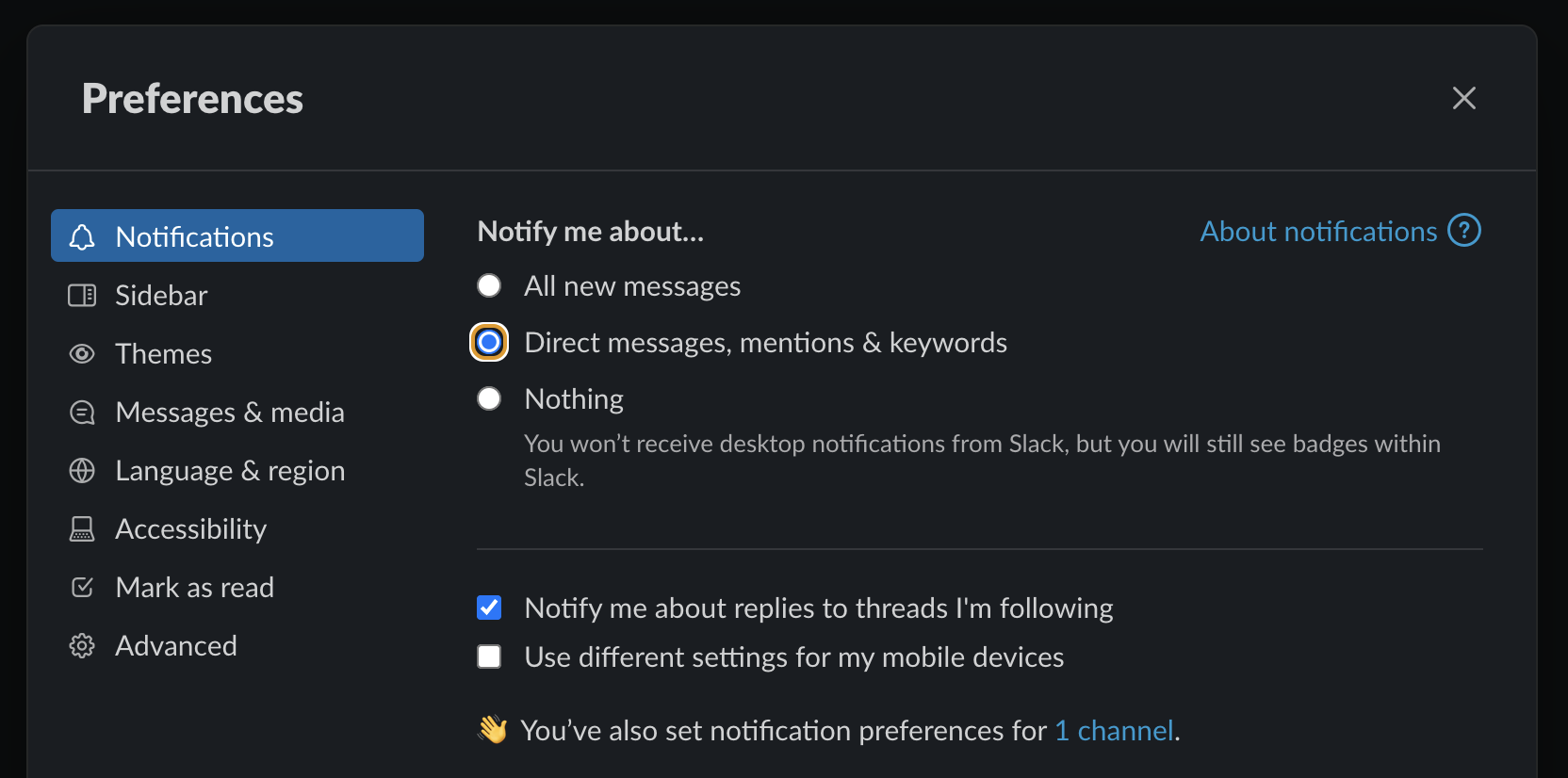
This will make it so you’re not notified every single time someone writes in a channel you’re in. But don’t worry — that channel will still be highlighted, and the app/workspace will still have a visual badge 🔴 letting you know there’s been activity since you last checked.
这样就可以做到,这样就不会在有人在您所在的频道中写信时就通知您。但是请放心-该频道仍会突出显示,并且应用程序/工作区仍将具有可视标记🔴让您知道自您上次检查以来一直有活动。
I’d also encourage you to revisit and trim down to the bare minimum the number of keywords you’ve set to be notified about (the setting is right below the Notify me about... section). Just think: If something is really important, you’ll end up knowing without having to have a keyword for it.
我也鼓励您重新访问并最小化要设置的要通知关键字的数量(该设置位于“ Notify me about...部分的正下方)。 试想一下:如果某件事确实很重要,那么您最终不必知道关键字就知道了。
Closely related to notifications is the concept of muting a channel 🔕. The easiest way to mute a channel is right-clicking on it on the sidebar:
与通知密切相关的是静音频道 concept的概念。 静音通道最简单的方法是在侧边栏上右键单击它:
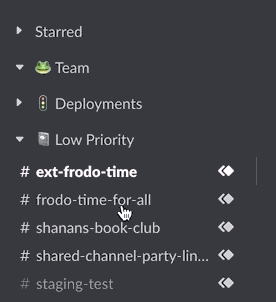
This makes it so the channel won’t be highlighted on new activity, but you’ll still be notified when mentioned in the channel. So it’s the ideal setting for distracting social channels like #mechanical-keyboards — while I love geeking out about keyboards, it’s not worth the distraction (even if only visual) every time someone posts a new picture of their new keeb.
这样一来,该频道就不会在新活动中突出显示,但是在该频道中提及您时仍会得到通知。 因此,这是分散诸如#mechanical-keyboards类的社交渠道的理想设置-虽然我喜欢细看键盘,但每次有人发布新的keeb图时,都不值得分心(即使只有视觉)。
A special mention on notifications: By default, you’ll get notified of every subsequent message when you’ve participated in or been mentioned in a thread. This is what you want most of the time, but I’m sure you’ve sometimes wished you could unsubscribe from a thread in which someone mentioned you by mistake. Well, you can:
关于通知的特别提及:默认情况下,您参与或在某个线程中被提及时,您将收到所有后续消息的通知。 这是您大部分时间想要的,但是我敢肯定您有时希望您退订某个人错误地提及您的主题。 好吧,您可以:
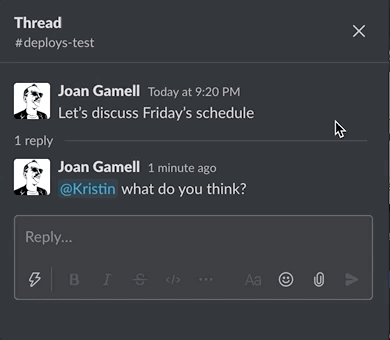
This also works the other way around: You can get notified on a thread without participating in it through the same menu.
这也可以用另一种方法来解决:您可以在线程上得到通知,而无需通过同一菜单参与。
组织重要事项-隐藏其余部分 (Organize the Important — Hide the Rest)
In this section, I honor the old adage “out of sight, out of mind” by hiding everything that’s not essential in your channel sidebar. This is my favorite part and also the one where I use some of the newest features we’ve released.
在本节中,我通过隐藏频道侧边栏中不重要的所有内容来纪念“不可见,不合时宜”的老话。 这是我最喜欢的部分,也是我使用我们发布的一些最新功能的部分。
Why hide stuff? Why can’t I have all my dozens or hundreds of channels visible? Well, you know as well as I do that even if you’re not getting notifications for new messages in distracting channels, the minute you see the #memes channel light up, you’ll click on it (at least I would). It’s just our nature. So let’s try minimizing our distractions by simply hiding those channels.
为什么要藏东西? 为什么我看不到所有数十个或数百个频道? 嗯,您也知道,即使您没有在分散注意力的频道中收到新消息的通知,在看到#memes频道亮起的那一刻,您#memes单击它(至少我会这样)。 这只是我们的本性。 因此,让我们通过简单地隐藏这些频道来尽量减少我们的干扰。
First, I created sections to organize my conversations. You can do so by hovering over the Channels header and clicking on the triple-dot button:
首先,我创建了一些部分来组织我的对话。 您可以通过将鼠标悬停在Channels标题上并单击三点按钮来实现:
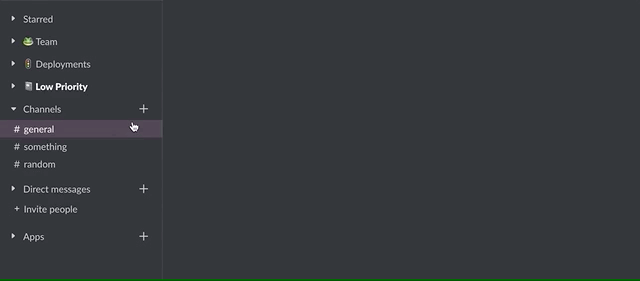
Sections are new and incredibly useful. Not only do they allow you to organize your channels in buckets by drag and drop, but you can also reorder the sections themselves and put the most important sections at the top. Lastly, they’re also collapsible, which is exactly what we want in order to hide our distracting channels. Note that sections can also hold direct messages.
这些部分是新的,非常有用。 它们不仅允许您通过拖放来组织存储桶中的频道,而且还可以自己对部分进行重新排序并将最重要的部分放在顶部。 最后,它们也是可折叠的,这正是我们想要隐藏我们分散注意力的渠道的目的。 请注意,这些部分还可以保存直接消息。
A special section is the Starred section. This section is automatically created once you star ⭐️ a channel or DM. While you don’t need to use it, I find it super useful as a way to quickly pin a channel or conversation to the top of the sidebar with a single click.
特别的部分是Starred部分。 为频道或DM加上星标后,会自动创建此部分。 尽管您不需要使用它,但我发现它非常有用,它可以通过单击将频道或对话快速固定到侧边栏的顶部。
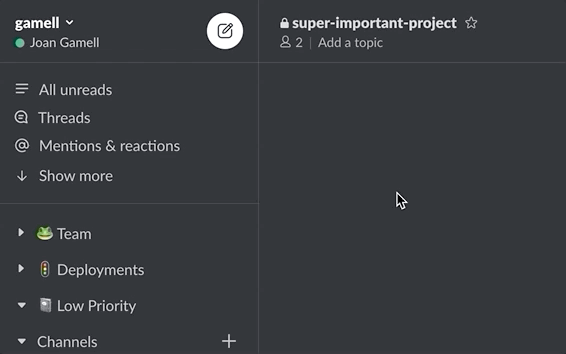
Another setting that literally changed my Slack life was Unread conversations only, which you can selectively enable for every section and which will completely hide the channels without new messages. This is extremely helpful to prevent yourself from visiting already-read conversations when you’re procrastinating or on autopilot and to reduce visual clutter.
真正改变了我的Slack生活的另一个设置是“ Unread conversations only ,您可以有选择地为每个部分启用该功能,这将完全隐藏频道,而不会发出新消息。 这对于防止您在拖延或自动驾驶时访问已经阅读的对话非常有帮助,并且可以减少视觉混乱。
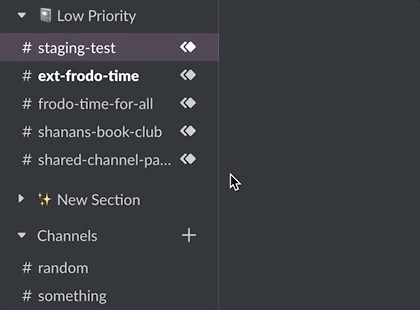
You will still be able to reach any hidden conversations through the ⌘+K (Ctrl+K on Windows) shortcut or by navigating back and forth with the ⌘+[ / ⌘+] shortcuts or through the top navigation bar (Ctrl+[ / Ctrl+] in Windows).
您仍然可以通过⌘+K (在Windows上为Ctrl+K )快捷方式,或通过⌘+[ / ⌘+]快捷方式来回导航,或者通过顶部导航栏( Ctrl+[ / Ctrl+]在Windows)。
Lastly, another neat setting I definitely recommend you turn on is the Order Conversations Based How You use Slack setting under Sidebar, which will order the conversations in your sidebar from most to least used. It’s great for keeping the most important stuff at the top.
最后,我绝对建议您打开另一个整洁的设置,即“ Sidebar下的Order Conversations Based How You use Slack进行会话的顺序设置”设置,该设置将在Sidebar将会话的使用顺序Sidebar排序。 将最重要的内容保持在顶部非常好。
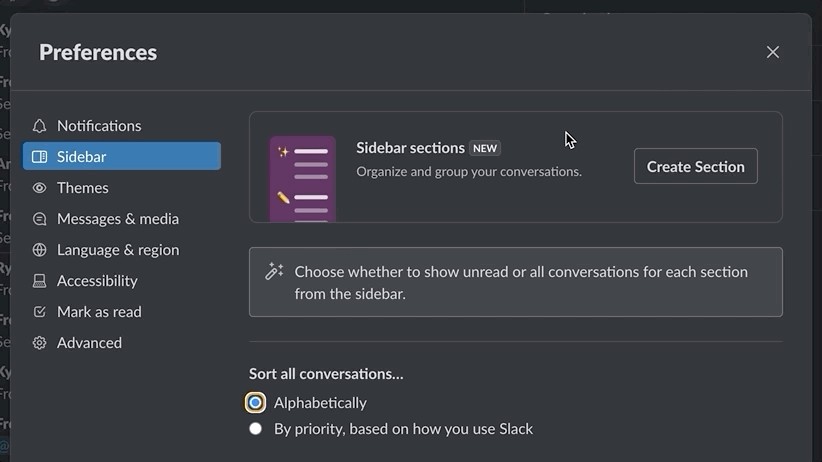
选择何时赶上 (Choose When to Catch Up)
Even with all the previous advice, you/ll have a hard time getting any real deep work done unless you go one step further into the Do Not Disturb (DND for short) mode.
即使有了所有先前的建议,您也将很难完成任何真正的深入工作 ,除非您进一步进入“ Do Not Disturb (简称DND)模式。
Let’s face it: Doing work that requires deep concentration requires you to be in the zone, which can’t be achieved if the Slack app icon is bouncing every couple of minutes.
面对现实:做需要高度集中的工作需要您进入区域,如果Slack应用程序图标每两分钟跳一次就无法实现。
My advice here is to carve out blocks of time during which you’ll activate the DND mode and set your Slack status to a variation of 🚫Focus Time to make it absolutely clear to your workmates that you’re actually very much working but would rather not be disturbed. I’ve found that one-hour blocks of focus time work best for me, but YMMV.
我的建议是在一段时间内激活DND模式并将 Slack状态设置为🚫Focus Time的变化,以使您的同事绝对清楚您实际上🚫Focus Time很大,但宁愿不被打扰。 我发现一小时的对焦时间最适合我,但是YMMV。
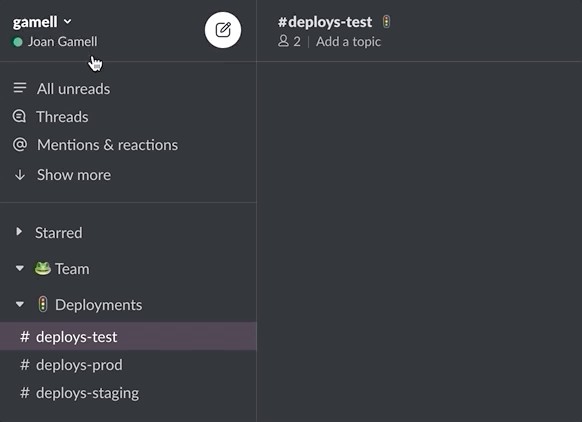
The best part is that during your DND period, your workmates can still force a notification to go through to your app if they really think it’s needed. Of course, this will depend on the Slack etiquette your company has, but in my experience, people tend to respect focus time and only force a notification through if it’s warranted.
最好的部分是,在您的免打扰期间,如果您的同事确实认为有必要,仍然可以强制将通知发送到您的应用程序。 当然,这取决于贵公司的Slack礼节,但以我的经验来看,人们倾向于尊重焦点时间,只有在有必要的情况下才强制通过通知。
Of course, going on DND for an extended period won’t be possible for certain kinds of jobs (like customer support or similar), so take this with a grain of salt.
当然,对于某些类型的工作(例如客户支持或类似的工作),长时间进行DND是不可能的,因此请格外小心。
付诸实践 (Put It in Practice)
Now that we have our Slack customized and optimized for productivity, let’s go over how I go about actually processing the messages in my inbox.
现在我们已经为生产力定制了Slack,并对其进行了优化,接下来让我们了解如何实际处理收件箱中的消息。
Many of my colleagues like to use the All Unreads view at the top left of the sidebar, as it’s a convenient place to see all your messages waiting to be processed. While this is a very valid option, I normally don’t use the All Unreads view because it muddles together the channels and conversations I really want to process before EOD (P0 + P1 in the first section) with everything else.
我的许多同事喜欢使用侧栏左上方的“ All Unreads视图,因为它是查看所有等待处理的消息的便捷位置。 尽管这是一个非常有效的选项,但我通常不使用“ All Unreads视图,因为它会将我真正想在EOD之前处理的频道和对话(在第一部分中为P0 + P1 )与其他所有内容混在一起。
Instead, I process messages badge-first, as any badge on the sidebar means I have P0 messages pending. Next, I process the conversations with new messages from top to bottom (which means from more to less important thanks to the sections and ordering), which takes care of the P1 and, optionally, the P2 messages. The trick is to know when you’ve gone low enough on your sidebar and you’re venturing into your P3 (aka not-really-important channels).
相反,我先处理徽章的消息,因为边栏上的任何徽章都表示我有待处理的P0消息。 接下来,我使用从上到下的新消息来处理对话(这意味着由于部分和顺序而从重要到不重要),这将处理P1消息,以及可选的P2消息。 诀窍是要知道何时边栏足够低并且您正在尝试进入P3 (又不是非常重要的频道)。
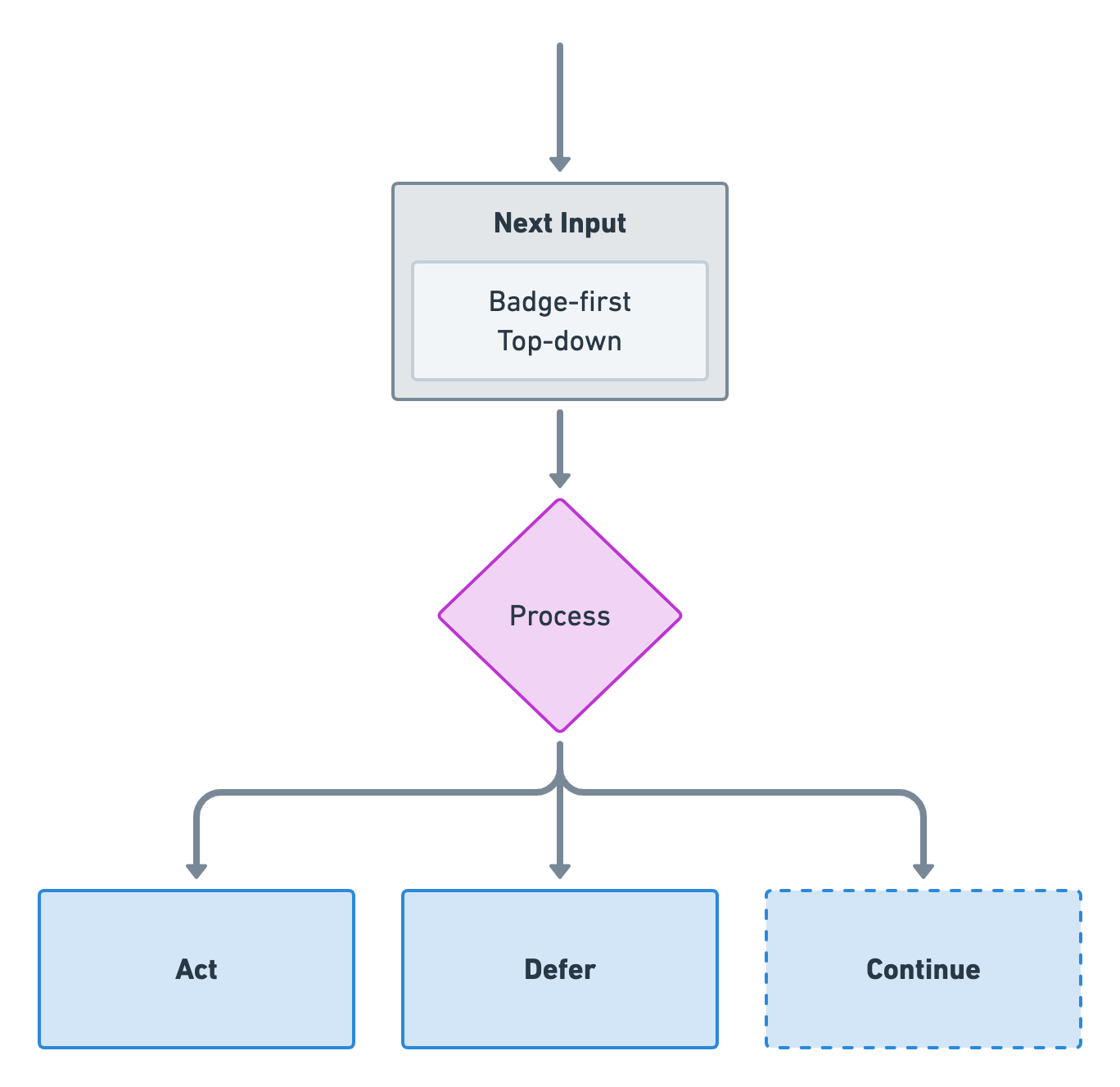
To wrap up, I personally try to reach a kind of Inbox Zero of “process all P0, P1 & P2” messages (although I cut myself some slack with the P2, and I might leave them unread until next morning). Note that I don’t really mean leaving all the messages read — I liberally mark messages as unread after processing for my future self to deal with in the morning. When I log into Slack any given morning, I usually have between 1-3 unread messages left from my yesterday self.
总结一下,我个人尝试达到一种“处理所有P0, P1 & P2 ”消息的“收件箱零”(尽管我在P2有所懈怠 ,直到第二天早上我可能都不会阅读它们)。 请注意,我并不是真正要保留所有邮件为阅读状态-在处理完我将来的自我以便早晨处理之后,我将邮件自由地标记为未读。 在任何给定的早晨登录Slack时,通常我的昨天自己剩下1-3条未读邮件。
Last trick: If your P3 messages fester and you’re too lazy to catch up, you can always Mark All As Read with Shift+ESC (be careful, as this will mark all conversations as read, so you better make sure there aren’t important unread messages before you do that!).
最后招:如果你的P3消息溃烂和你懒得追赶,你可以随时Mark All As Read用Shift+ESC ( 注意,因为这将标志着所有对话为已读,所以你最好确保有AREN”在您这样做之前,请先阅读重要的未读邮件!)。
And that’s about it. This is the system that works for me and a similar one to other people I know who are Slack superusers. Feel free to take the parts that work for you and discard the parts that don’t. Cheers!
就是这样。 这是适用于我的系统,并且与我认识的其他人一样都是Slack超级用户。 随意选择对您有用的零件,并丢弃无效的零件。 干杯!
翻译自: https://medium.com/better-humans/a-slacks-engineer-system-to-using-slack-efficiently-17168c930b89
slack 开源系统
相关文章:
这篇关于slack 开源系统_一个有效利用Slack的Slack工程师系统的文章就介绍到这儿,希望我们推荐的文章对编程师们有所帮助!







